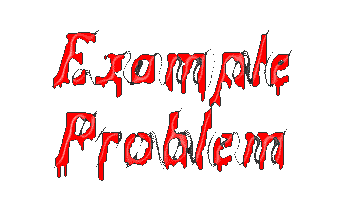
 |
Problem: A volume of 50 mL of 1.8 M NH3 is mixed with an equal volume of a solution containing 0.95 g of MgCl2. What mass of NH4Cl must be added to the resulting solution to prevent the precipitation of Mg(OH)2? Ksp of Mg(OH)2 = 1.5 E-11, Ka of NH4+ = 5.6 E-10 |
|
Solution: Let's take a look at what's going on here. |
|
|
|
Okay, so we have three reactions. The first one is the dissociation reaction for MgCl2, which will go to completion, since MgCl2 is a metal salt, and metal salts dissociate completely. The second one tells us how much OH¯ will be in solution after NH3 reacts with water. The third one is the formation reaction for Mg(OH)2. |
|
So what do we do now? First let's convert the mass of MgCl2 to moles and find the total volume of the solution. |
|
0.95 g MgCl2 * (1 mol MgCl2)/(95 g MgCl2) = 0.010 moles MgCl2 V = 50 mL + 50 mL = 100 mL = 0.100 L |
|
Now let's look at the Ksp formula for Mg(OH)2. |
|
Ksp = [Mg][OH¯]2 1.5 E-11 = [0.01/0.100][OH¯]2 [OH¯] = 1.2 M (This is the concentration of OH¯ that will cause Mg(OH)2 to precipitate) |
|
Now that we know what concentration of OH¯ will precipitate Mg(OH)2, we just plug that into the formula for reaction # 2: |
|
Kb = 1.8 E-5 = [NH4+][OH¯]/[NH3] 1.8 E-5 = [NH4+][1.2]/[1.8/2] ([NH3 is halved because we doubled the volume) [NH4+] = 1.4 E-5 |
|
So, as long as you have more than 1.4 E-5 NH4+ in solution, Mg(OH)2 will not precipitate. From here on it's a Mickey Mouse stoich problem. |
|
1.4 E-5 M NH4+ = 1.4 E-5 M NH4Cl * 0.100 L * (53.5 g NH4Cl)/(1 mol NH4Cl) = 7.49 E-5 g NH4Cl. |
And there you have it. Now that you've conquered your first Type 1 problem, let's move on to Type 2 problems. |


|